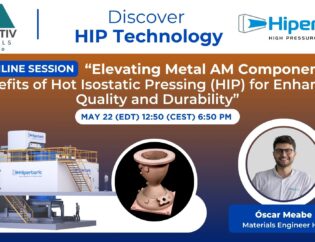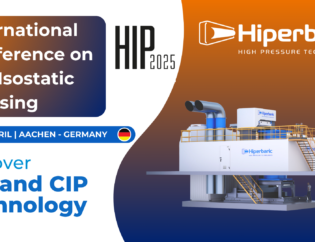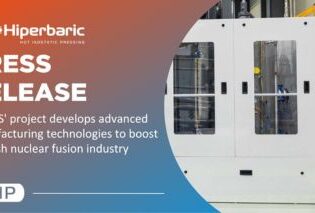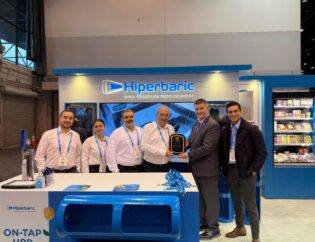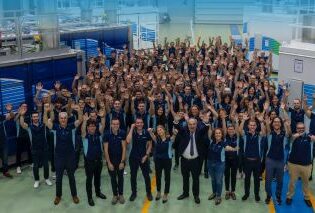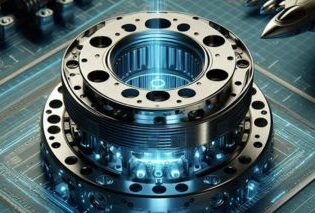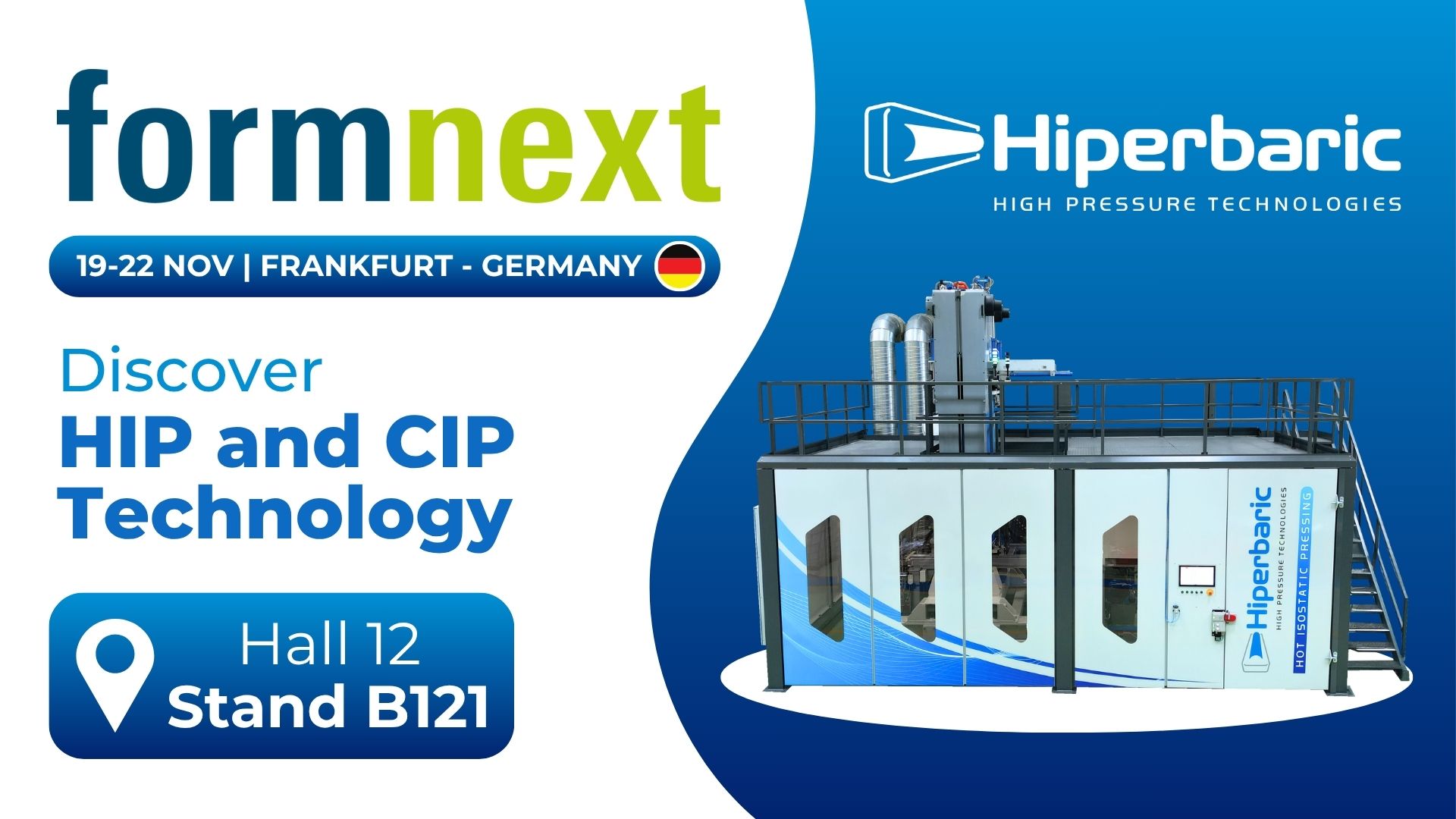
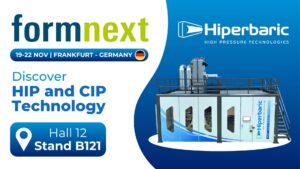
The Spanish manufacturer of high-pressure technology presents its range of Hot Isostatic Presses (HIP) as the key solution to densify critical components and eliminate porosity in 3D-printed parts
Burgos, Spain, 11 November – Hiperbaric, the world leader in industrial high-pressure equipment, arrives at Formnext to showcase its state-of-the-art Hot Isostatic Pressing (HIP) technology. As the global additive manufacturing (AM) ecosystem gathers for its must-attend annual event, Hiperbaric positions itself as the indispensable strategic partner for the critical step that comes next: post-processing.
Hiperbaric’s presence underscores a decisive commitment to providing enabling technology that maximizes the performance of 3D-printed metal and ceramic parts. HIP technology is the key to improving the mechanical properties and structural integrity of critical components.
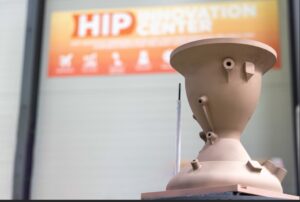
“For an industry seeking nanometric perfection, eliminating internal porosity is not an option; it is a necessity,” says Andrés Hernando, CEO of Hiperbaric. “HIP is the technological enabler that dramatically improves the mechanical properties and structural integrity of critical components, making AM viable for mass production in the most demanding sectors.”
The Solution to Additive Manufacturing’s “Achilles’ Heel”
Hiperbaric’s technology directly addresses the primary challenge of metal AM. Processes such as Selective Laser Melting (SLM) or Electron Beam Melting (EBM) create parts layer-by-layer, a method that can inherently leave residual micro-porosity.
While this may be irrelevant for a prototype, for a turbine blade, a medical implant, or a high-performance racing engine part, this porosity represents a potential failure point.
HIP is the post-processing step that elevates an AM part to the quality of a forged material. It transforms a porous or micro-cracked material into a solid, monolithic, and homogeneous structure, guaranteeing it meets the strictest mechanical specifications.
How Hot Isostatic Pressing Works
Hot Isostatic Pressing is an advanced manufacturing and heat treatment process that subjects components to two simultaneous forces: high temperature and high isostatic pressure.
The component is placed inside a high-pressure vessel. This chamber is heated to temperatures that can reach 2,000°C (3,632°F) and is simultaneously pressurized with an inert gas (usually argon) to pressures of up to 2,000 bar (29,000 psi).
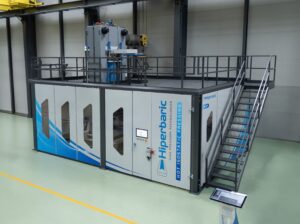
Hiperbaric’s innovation and experience in high-pressure processing have enabled the manufacture of modern HIP equipment, improving performance and reducing costs. Its wire-wound vessel technology not only has advantages from a safety and reliability point of view, such as increased service life or the “leak-before-break” design that prevents catastrophic failures, but also provides advantages from a thermodynamic point of view.
Being a wire-wound vessel, the cooling channels can be placed very close to the vessel wall and therefore very close to the hot zone, allowing the vessel to act as a heat exchanger, enabling fast cooling inside the equipment. Through a fan and valves located in the lower part of the oven, forced convection is activated by circulating the hot gas through a heat exchanger located in the upper cap, which exits and descends in contact with the wall of the vessel (which is cooled) and re-enters the oven.
The ability to Fast Cooling within HIP equipment, in addition to the obvious advantages in terms of increased productivity, reducing production times and energy consumption – which translates into savings – has a series of advantages from a material science perspective, improving the microstructure and physical properties. Thanks to fast cooling, it is also possible to carry out heat treatments within the same equipment, opening the door to combined cycles (Combined HIP – Heat Treatment, CHIP-HT).
The effect is two fold:
- Porosity Elimination: The combination of heat and pressure applied uniformly from all directions (“isostatic”) causes internal pores and microscopic voids to collapse and diffusion-bond.
- Full Densification: The result is a component that achieves 100% theoretical density. This process drastically improves ductility, fatigue strength, impact resistance, and fracture toughness.
Hiperbaric has developed a cutting-edge range of HIP presses specifically designed to meet the exacting needs of the aerospace, energy, medical, and metallurgy industries.
A Technological Milestone: 100% Spanish HIP Reaches Taiwan
Hiperbaric recently marked a major industrial milestone by supplying the first 100% Spanish-developed HIP system to Taiwan. This equipment is Hiperbaric 93 HIP, destined for Taiwan’s highly demanding aerospace industry, serves as a crucial validation. This strategic sale not only demonstrates Hiperbaric’s ability to compete at the highest global level but also underscores the robustness, reliability, and advanced engineering of its presses in one of the world’s most rigorous sectors.
About Hiperbaric
Hiperbaric is the world’s leading company in the design, manufacture, and servicing of industrial high-pressure equipment. Headquartered in Burgos, Spain, since 1999, the company has a global presence with offices in Miami (USA), Shanghai (China), and Mexico. Hiperbaric is renowned for its High Pressure Processing (HPP) technology for the food industry and has leveraged its decades of expertise to develop a cutting-edge line of Hot Isostatic Presses (HIP) for advanced materials, additive manufacturing, and critical component densification.




